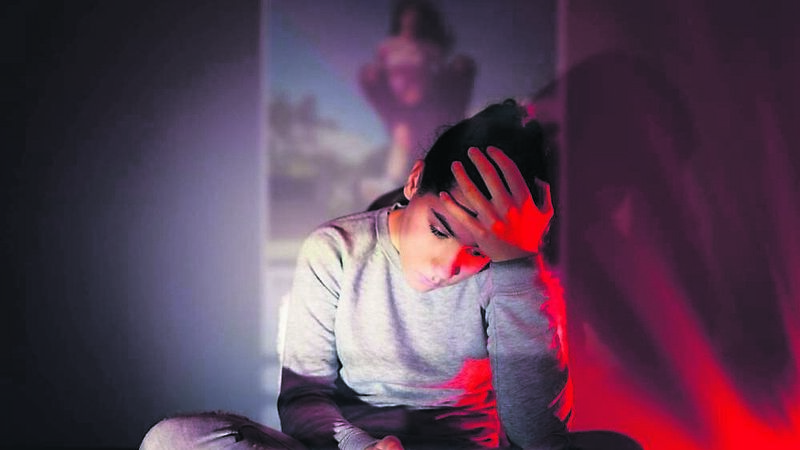Cork Views: Time for parents to take lead in digital world

We have allowed a situation to evolve where children access the online world. iStock/posed
There are two places I am completely free from my phone – in my bed and in the swimming pool. Since my children have left home and are no longer gallivanting late into the night, I no longer have it beside me in bed but firmly muted in another room.
When I am in the pool underwater, goggled and focused on my breathing, my mind drifts down alleyways I haven’t had the opportunity to explore during the rest of my day. Most of these articles are written in the pool.
I am not the only one. Almost all of us spend our days and many of our nights glued to our phones and the content that squirrels its way into our brains.
It doesn’t have to be this way. We can change the laws nationally and we can change the house rules to get all of us off our phones.
At a recent press conference, Australian Prime Minister Anthony Albanese was asked by an 11-year-old whether he thought social media had an impact on kids.
“It certainly does and that’s why we’re going to ban social media for under-16s,” Mr Albanese replied. “I want to see you all out playing with each other at lunchtime, talking to each other like we are now, and engaging with each other... rather than just being on your devices.”
In a world dominated by social media, a world where children and teens interact without phones sounds absurdly naïve.
But the damage caused to kids by social media is indisputable.
On December 10, Australia will implement a 16-year-old age limit for users of platforms such as Snapchat, Tik Tok, Facebook, Instagram, and X. They are the first nation in the world to stand up to the power of digital media. The real question is – will it work and how many other nations will follow suit?
Age restrictions
Digital platforms argue that age restrictions are already in place, with self-imposed age limits of 13. In fact, these restrictions are meaningless as all that is required is to input a false date of birth.
Australia will place the onus on companies to introduce robust age limit safeguards, with heavy fines applied where a systemic breach occurs. This is a brave move - placing the onus on platforms rather than children or their parents to protect them from content that is not appropriate for their age. It has the capacity to transform the global culture around the clearly toxic social media content that is universally available to kids and young teens.
French Education Minister, Anne Genetet said in November, when the plans were announced, that the EU should “urgently follow Australia’s example”. Other countries keenly monitoring the success of this proposal include, the UK, Singapore, Japan, the US as well as Ireland.
Last month, Tánaiste Simon Harris vowed to force social media companies to adopt age verification for users, with stiff penalties imposed on online platforms that fail to comply.
Following the release of the Netflix series Adolescence, Mr Harris said that as a father of two young children, he found it “compelling, harrowing and deeply moving”, adding that the show has “made me more determined than ever to address an issue that requires an all-of-Government response. The era of self-regulation is over and in this vein I am committed to examining ways to enforce age verification obligations on online service providers and hold them to account if they fail to do so”.
While the Australian government has laid down a template for action, it remains to be seen if the Irish government follows suit.
Digital literacy
Phone addiction is not just about the law. Rules within homes govern how we all behave around them. Such rules are not easy to change but that doesn’t mean we should not try.
There is a movement to improve digital literacy to inform adults, including parents and teachers, of both the harms experienced online as well as the missed opportunities spent in engaging with our families or friends by having our head stuck in our phones
Founder of Digital Tweens, Australian Mark Yeowell, describes in The Digital Tweens blog a model called DRIVER that allows parents to take the front seat as a digital parent.
D is for delay – wait until your child needs a phone (emotionally, socially, cognitively). Yeowell reckons that is generally around the age of 14, which gives children more time to play, mature and enjoy being a child in a world that often and unnecessarily rushes them towards adulthood.
R is for restrict - start with clear rules, boundaries and restrictions and loosen them as the child develops responsibility. Initially, that means no social media, screen-free zones (bedrooms and mealtimes) and managed screentime limits.
I is for involved – be present, not as a watchdog but as a guide, coach and companion. The message is you care about their digital life just as much as their real life.
V is for visibility - digital devices are kept in shared family spaces, not in bedrooms or bathrooms and you have access to passwords.
E is for educate - don’t assume your child understands the digital world just because they swipe, tap and scroll. Teach them what they need to thrive. That includes recognising clickbait, scams, privacy settings, algorithms and talking about pressures of social media.
R is for role model – your example is the most powerful tool, online and offline. Being a digital parent means putting devices away for family time, actively choosing when to be online, and demonstrating respect by communicating with kindness, avoid over-sharing and modelling healthy digital behaviour.
It is difficult to fathom how we have allowed this situation to evolve. Over the last decade, not only have we as adults embraced smartphones and social media as essential tools for daily life, unbelievably we have almost unquestioningly allowed kids as young as eight and nine to sit in their rooms or awake at night - glued to their phones while they are exposed to bullying, humiliation and overwhelming negative emotions.
We listen to researchers and online platforms arguing about the science in terms of dangers to our mental health while the evidence is screaming at us both inside and outside our homes.
These harms need to be addressed now - not at some point in the future.
We need stricter rules that protect children from online harm, and digital literacy programmes for everyone – children, teens and adults - that address the reality of the harm being done to children online. At the same time, we need to free up space and resources in children’s and teen’s lives so they have to autonomy to freely engage face-to-face with each other.
Final thought from Yeowell: “You don’t need to be a tech expert to be a great digital parent. You just need to be present, prepared and willing to learn alongside your child.”







 App?
App?




